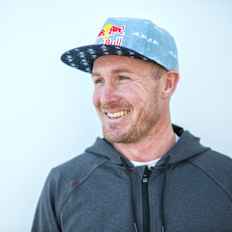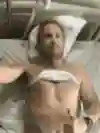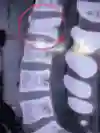Surfing
I jumped off my board. I was expecting impact. It would be a bad wipeout and it was going to hurt.
But there was no impact.
In big wave surfing, usually you jump off, get pounded, get a sort of washing machine effect underwater and then you pop up. This one was different; it was surreal and seemed to go on for an extended amount of time. Then, just as I relaxed, I hit the flat part of the water.
That’s when I broke my back.

7 min
Looking back at the historic 2017–18 winter season at Nazaré
Filmer Alex Laurel goes back through hours of epic footage from the 2017–18 winter season at Nazaré to bring us a mind-blowing highlights package, featuring Andrew Cotton, Hugo Vau and Lucas Chianca.
American surfer Garrett McNamara and I pioneered Nazaré, Portugal, as a big wave spot in the early 2010s. By the time of my accident – November 8, 2017 – I’d already caught some of the biggest waves of my life there.
Each season you have one swell which can make your career. November 8 was one of those swells; it was huge, the direction was really good, the local conditions and winds were really good. For me it was now or never. It was ‘today’s going to be the day that someone gets a life-changing wave.’
It went from the best looking wave to the worst looking wave in a millisecond, and I was in the worst spot
I was surfing with Hugo Vau, a Portuguese surfer, and Garrett. We got out about 9.30am and were set for a full day in the water, the three of us taking turns between surfing, driving the jet ski and doing safety.
I was four or five waves into my second turn of surfing, about 10-10:30am, when I saw this wedge coming in. It looked like the dream wave. There were some really hollow, heavy inside lefts. The holy grail. When I saw this wave it just looked like one of those lefts. Garrett towed me in. I let go of the rope and came off the bottom a bit too low, so probably my line wasn’t great. Then the wave changed in an instant. Rather than barrelling it looked like it was going to pinch. It went from the best looking wave to the worst looking wave in a millisecond, and I was in the worst spot. I thought, ‘Crap, I’ve just fully stuffed myself into this wave and I’ve got nowhere to go now.’
I instantly knew that it wasn’t good
There was a lot of pain and shock. You go into survival mode. We wear inflatable vests under our suits but the pain was so bad I couldn’t even manage to inflate the vest. I finally surfaced for a millisecond then the next wave behind caught me and took me out as well. It was a two-wave wipeout. I broke my back on the first wave, was underwater for some time, then the next wave mowed me down. It was on the second wave that I managed to compose myself, pull my vest and they managed to rescue me.
Hugo got to me on the jet ski. He could telI I was in pain but he didn’t know what was going on. As we got to the shore we got hit by another wave, which knocked us both off the ski. Luckily we were close to the shore and got washed up. I had a gut feeling that I couldn’t stand or walk.
In the water I had gone into survival mode. Now, on the beach, I was scared. A lifeguard and another surfer ran down and dragged me up the beach. They stabilised me and cut my wetsuit off. The ambulance was there within minutes, they put a collar on me and then took me straight to hospital.
I was trying to work out, ‘OK, what does that mean? What’s the scenario going to be now?’
I don’t speak any Portuguese. They scanned my back and said I had a compression fracture. I was trying to work out, ‘OK, what does that mean? What’s the scenario going to be now?’ My thoughts ran wild as I didn't know the prognosis for sure. I also didn’t have any of my stuff with me so I couldn’t call my wife. She found out because it was all over social media. Someone rang her and said I’d broken my back. I had no way of speaking to her so I think she had a worrying few hours of wondering what was going on. My son was five at the time and when we eventually spoke he asked if I was going to be in a wheelchair.
I glanced at Garrett and it was the first time I’ve ever seen him look worried
I was in hospital in Portugal for two weeks. At first I was distracted from the pain and what had happened because I was getting lots of messages and doing interviews from my hospital bed. It wasn’t until a day-and-a-half into my hospital stay that it really hit me.
I lay down and the worry hit me: ‘Am I going to walk again?'
They put this back brace on and said I had to try to walk. Garrett and Hugo were both in the room. The nurse sat me up and I was in agony. I couldn’t even put my foot on the floor. The pain was crazy. I glanced at Garrett and it was the first time I’ve ever seen him look worried. You know when it’s not the actual situation you’re in, it’s when you see someone else’s reaction? I thought, ‘This is pretty serious; I’ve done it this time.’
Afterwards, I felt nauseous. They sent me back for more x-rays, this time on my head. There was fear, but not from someone saying something to me; it was from within myself, as I tried to work out what was really going on.
I laid down and the worry hit me: ‘Am I going to walk again?”
I did start thinking of my back as healing, not broken
I definitely freaked out but I also had some really cool people giving me advice. Garrett’s wife was filling me in on the power of positivity. She said: "People will be giving you the worst-case scenarios, referring to your back as broken. But you have to turn it around and refer to your back as healing – it’s going to get better."
It really helped. I did start thinking of the better things and thinking of my back as healing, not broken.
I knew I wouldn't be able to surf for some time, so I had to accept that. Someone actually set a new World Record that day, so all the things I was aiming for and building up to, they were all gone anyway so there was no point in thinking about that.
They told me: ‘You have a broken back, here’s a back brace, lie down or walk, don’t sit’
I was flown back from Portugal straight to see a spinal specialist in Manchester. It was really reassuring knowing Red Bull had organised that support for me. In two weeks I was on a stationary bike training and the physio had mapped what the next six months would look like. It wasn’t scary, I felt lucky. If I wasn’t a Red Bull athlete I would have just been discharged in Portugal and that would have been it. All they told me was, ‘You have a broken back, here’s a back brace, lie down or walk, don’t sit,’ and that was it.
It was amazing to be treated like a proper athlete. Surfers don’t always get treated like athletes, they get treated like lunatics. We’re not on a football team so we don’t always have access to the best physios or the best information and the best doctors. So for me, mentally, having a physio was a massive weight off my shoulders.
The approach was, ‘Forget about surfing and all the things you can’t do.’ I just threw myself into my rehab and even tried to enjoy it. I couldn’t walk, but I could walk in the pool and do leg raises. It was really boring but I used to love it. I used to do it twice a day for three hours. Things you’d taken for granted are at the forefront of your mind: what can speed up my recovery? I had loads of advice and I just threw myself into that process.
There were moments where I would doubt everything
You do have low periods. Nights can be long. I was struggling a lot with social media and FOMO. I had spells where I deleted all my social media and didn’t use the phone. Phones can be the worst, especially when you’re in a bad place. There were moments where I would doubt everything and worry about everything. You think: ‘Is my back going to be alright? Am I going to be as good as I was? Is the dream over? Is that it?’ That goes in and out of your head and you do have bad days.
My trainer at home, Blakey, was good at the mental side of it; he was my shoulder to cry on. My physios in Manchester were amazing too. You could text them at 10pm at night because your back was twingeing and your mind had started spiralling, thinking the worst. They’d always reply and tell you what to do. It was important to have that support network.
The gym work was almost like rebuilding a house, getting into the deep core muscles
They say the bone takes nine months to heal. Anyone who likes sport and being active, we like big full movements, not working on individual body areas. I don’t spend much time in the gym, I like to go surfing, or riding my bike. But during recovery those things were so far away. The gym work was almost like rebuilding a house, getting into the deep core muscles. I learned so much about training and it actually became an opportunity for me to become stronger and fitter. In a weird way, the injury and physio actually became an opportunity for me to become stronger and fitter. I’m more conscious of how I move. It’s probably prolonged my career because I am more conscious about my body and how to look after it.
The first dip back in the ocean, I felt like I was re-learning again
I was surfing again at my local beach within six months. The first dip back in the ocean, I felt like I was re-learning again. My body was just stiff. You have to put the brake on a bit and step back. You want to be riding your shortboard and doing progressive turns but you have to realise you won’t be able to do that for a while. You’re surfing, but you’re not surfing. The ego takes a bashing so you have to be able to disconnect from that and enjoy it for what it is, just riding waves and not performing how you want to perform or as well as you know you can.
I was back in Nazaré surfing big waves within a year. I wasn’t scared, but it did raise a few questions in my mind: ‘Is this my path, is it this what I really want to do?’ But as soon as you get back out there, as soon as the first big swell comes in, you become comfortable again very quickly and you realise you’re doing it for the right reasons, because you love it. You’re not trying to prove anything to anyone, you’re doing it for you.
Coming back from the injury was about learning to enjoy the things you can do, and not thinking about the things you can't
Coming back from the injury was about learning to enjoy the things you can do, and not thinking about the things you can't. There's so much negativity in your head in any situation, but you just have to block that out and focus on what's possible.
Two years on, I’ve competed in the WSL Nazaré tow challenge and was super happy with my results. I’ve probably ridden some of the bigger waves of my career this season. Now, I’m generally feeling positive and am working on a few filming projects, which has been good. I just feel very lucky to be back – it's something I will never take for granted.












